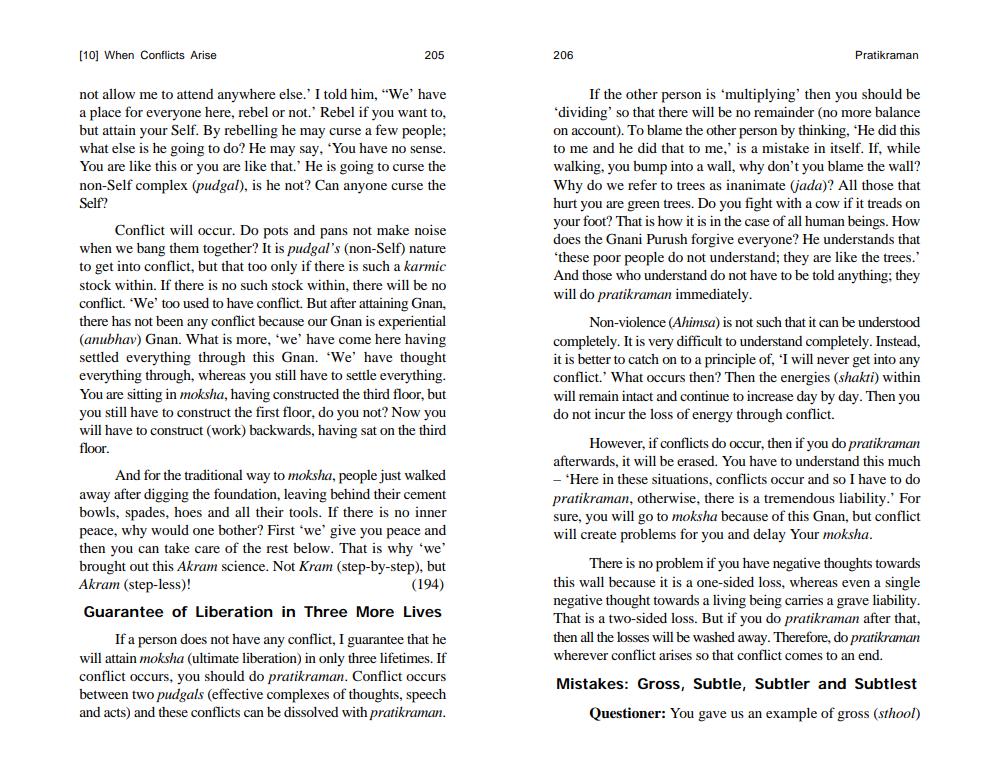________________
[10] When Conflicts Arise
205
not allow me to attend anywhere else.' I told him, "We' have a place for everyone here, rebel or not.' Rebel if you want to, but attain your Self. By rebelling he may curse a few people; what else is he going to do? He may say, 'You have no sense. You are like this or you are like that.' He is going to curse the non-Self complex (pudgal), is he not? Can anyone curse the Self?
Conflict will occur. Do pots and pans not make noise when we bang them together? It is pudgal's (non-Self) nature to get into conflict, but that too only if there is such a karmic stock within. If there is no such stock within, there will be no conflict. 'We' too used to have conflict. But after attaining Gnan, there has not been any conflict because our Gnan is experiential (anubhav) Gnan. What is more, 'we' have come here having settled everything through this Gnan. 'We' have thought everything through, whereas you still have to settle everything. You are sitting in moksha, having constructed the third floor, but you still have to construct the first floor, do you not? Now you will have to construct (work) backwards, having sat on the third floor.
And for the traditional way to moksha, people just walked away after digging the foundation, leaving behind their cement bowls, spades, hoes and all their tools. If there is no inner peace, why would one bother? First 'we' give you peace and then you can take care of the rest below. That is why 'we' brought out this Akram science. Not Kram (step-by-step), but Akram (step-less)! (194) Guarantee of Liberation in Three More Lives
If a person does not have any conflict, I guarantee that he will attain moksha (ultimate liberation) in only three lifetimes. If conflict occurs, you should do pratikraman. Conflict occurs between two pudgals (effective complexes of thoughts, speech and acts) and these conflicts can be dissolved with pratikraman.
206
Pratikraman
If the other person is 'multiplying' then you should be 'dividing' so that there will be no remainder (no more balance on account). To blame the other person by thinking, 'He did this to me and he did that to me,' is a mistake in itself. If, while walking, you bump into a wall, why don't you blame the wall? Why do we refer to trees as inanimate (jada)? All those that hurt you are green trees. Do you fight with a cow if it treads on your foot? That is how it is in the case of all human beings. How does the Gnani Purush forgive everyone? He understands that 'these poor people do not understand; they are like the trees.' And those who understand do not have to be told anything; they will do pratikraman immediately.
Non-violence (Ahimsa) is not such that it can be understood completely. It is very difficult to understand completely. Instead, it is better to catch on to a principle of, 'I will never get into any conflict.' What occurs then? Then the energies (shakti) within will remain intact and continue to increase day by day. Then you do not incur the loss of energy through conflict.
However, if conflicts do occur, then if you do pratikraman afterwards, it will be erased. You have to understand this much - *Here in these situations, conflicts occur and so I have to do pratikraman, otherwise, there is a tremendous liability.' For sure, you will go to moksha because of this Gnan, but conflict will create problems for you and delay Your moksha.
There is no problem if you have negative thoughts towards this wall because it is a one-sided loss, whereas even a single negative thought towards a living being carries a grave liability. That is a two-sided loss. But if you do pratikraman after that, then all the losses will be washed away. Therefore, do pratikraman wherever conflict arises so that conflict comes to an end.
Mistakes: Gross, Subtle, Subtler and Subtlest
Questioner: You gave us an example of gross (sthool)




